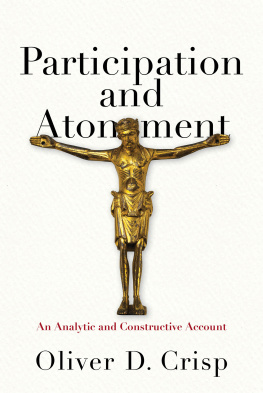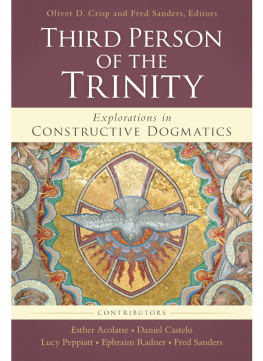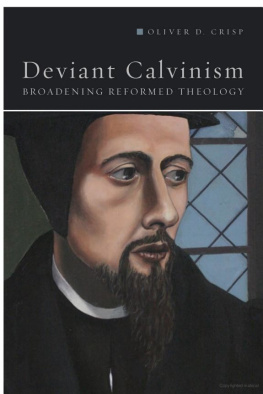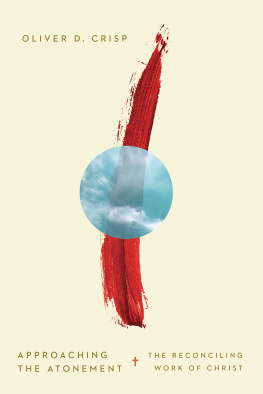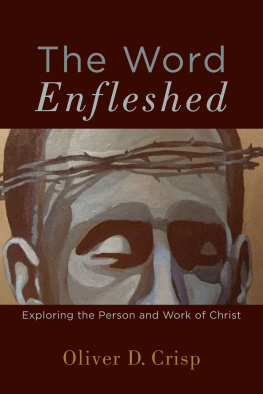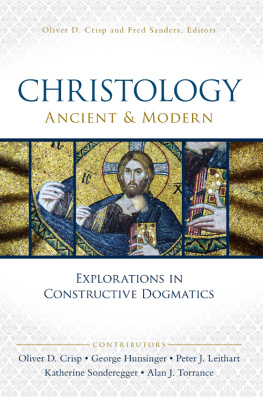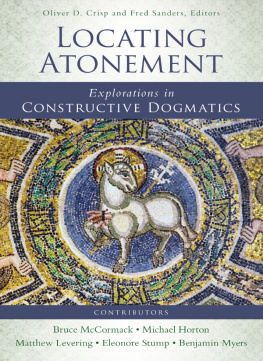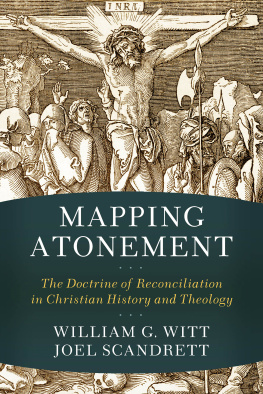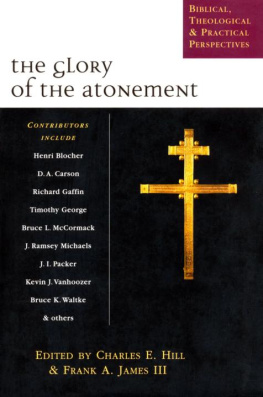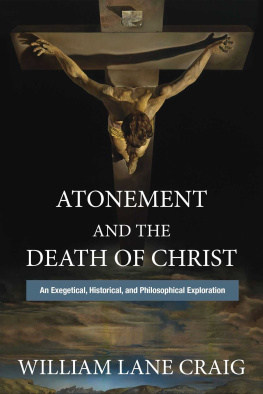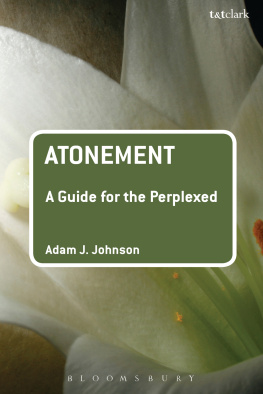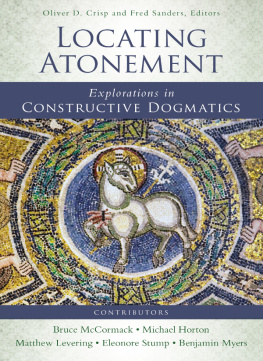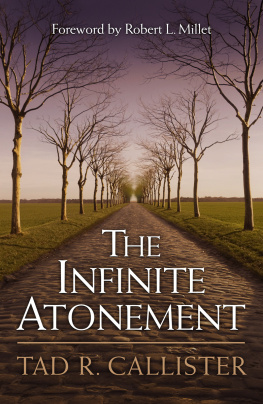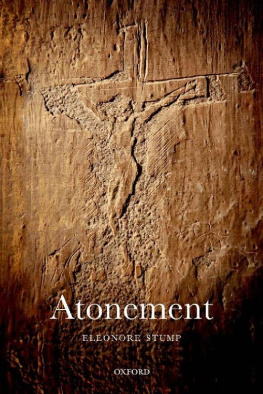Oliver D. Crisp - Participation and Atonement: An Analytic and Constructive Account
Here you can read online Oliver D. Crisp - Participation and Atonement: An Analytic and Constructive Account full text of the book (entire story) in english for free. Download pdf and epub, get meaning, cover and reviews about this ebook. year: 2022, publisher: Baker Publishing Group, genre: Religion. Description of the work, (preface) as well as reviews are available. Best literature library LitArk.com created for fans of good reading and offers a wide selection of genres:
Romance novel
Science fiction
Adventure
Detective
Science
History
Home and family
Prose
Art
Politics
Computer
Non-fiction
Religion
Business
Children
Humor
Choose a favorite category and find really read worthwhile books. Enjoy immersion in the world of imagination, feel the emotions of the characters or learn something new for yourself, make an fascinating discovery.
- Book:Participation and Atonement: An Analytic and Constructive Account
- Author:
- Publisher:Baker Publishing Group
- Genre:
- Year:2022
- Rating:3 / 5
- Favourites:Add to favourites
- Your mark:
- 60
- 1
- 2
- 3
- 4
- 5
Participation and Atonement: An Analytic and Constructive Account: summary, description and annotation
We offer to read an annotation, description, summary or preface (depends on what the author of the book "Participation and Atonement: An Analytic and Constructive Account" wrote himself). If you haven't found the necessary information about the book — write in the comments, we will try to find it.
Participation and Atonement: An Analytic and Constructive Account — read online for free the complete book (whole text) full work
Below is the text of the book, divided by pages. System saving the place of the last page read, allows you to conveniently read the book "Participation and Atonement: An Analytic and Constructive Account" online for free, without having to search again every time where you left off. Put a bookmark, and you can go to the page where you finished reading at any time.
Font size:
Interval:
Bookmark:
2022 by Oliver D. Crisp
Published by Baker Academic
a division of Baker Publishing Group
PO Box 6287, Grand Rapids, MI 49516-6287
www.bakeracademic.com
Ebook edition created 2022
All rights reserved. No part of this publication may be reproduced, stored in a retrieval system, or transmitted in any form or by any meansfor example, electronic, photocopy, recordingwithout the prior written permission of the publisher. The only exception is brief quotations in printed reviews.
Library of Congress Cataloging-in-Publication Data is on file at the Library of Congress, Washington, DC.
ISBN 978-1-4934-3221-9
Unless otherwise indicated, Scripture quotations are from the New Revised Standard Version of the Bible, copyright 1989 National Council of the Churches of Christ in the United States of America. Used by permission. All rights reserved.
Scripture quotations labeled KJV are from the King James Version of the Bible.
Baker Publishing Group publications use paper produced from sustainable forestry practices and post-consumer waste whenever possible.
To the scholarly community of St. Marys College,
University of St. Andrews,
with great affection
For in him all the fullness of God was pleased to dwell, and through him God was pleased to reconcile to himself all things , whether on earth or in heaven, by making peace through the blood of his cross.
Colossians 1:1920 (NRSV, emphasis added)
He brought me to the banqueting house, and his banner over me was love.
Song of Songs 2:4 (KJV)
Half Title Page
Title Page
Copyright Page
Dedication
Epigraph
Acknowledgments
Introduction
Part 1: Approaching the Atonement
1. Methodological Issues
2. The Value and Necessity of Atonement
Part 2: Models of Atonement
3. Moral Exemplarism and Transformation
4. The Ransom Motif
5. Satisfaction Guaranteed
6. Problems with Penal Substitution
Part 3: Atonement and Salvation
7. Sin and Salvation
8. Representation and Atonement
9. The Mystical Body of Christ
10. Soteriological Synthesis
Bibliography
Index
Back Cover
T his book has been a long time in gestation. It began life in the University of Bristol in England around 2007, traveled across the Atlantic with me when I moved to Fuller Theological Seminary in Los Angeles in 2011, where it grew and developed, and then returned back to Great Britain via the University of Notre Dame in 2019, finally coming to land in the University of St. Andrews in Scotland, where the last chapters were added in the years 201921. In pursuing some of the issues that inform this work, I ended up writing an LLM thesis on punishment theory under the supervision of Dr. Elizabeth Shaw at the University of Aberdeen, though none of that work made it into the final volume. (It was a case of having to do the work to be clear that it did not need to be included in the volume.) All in all, it has been quite an adventure.
Perhaps unsurprisingly for a work this long in preparation, its composition has generated many debts. I gladly acknowledge them here. In particular, the following friends and colleagues gave of their time and expertise to assist me as I have worked on this project: Rev. Dr. James Arcadi, Professor Jc Beall, Dr. Kutter Callaway, Rev. Dr. Joshua Cockayne, Dr. Aaron Cotnair, Professor Ivor Davidson, Professor Gavin DCosta, Dr. Christopher Eberle, Dr. Joshua Farris, Professor Thomas Flint, Jesse Gentile, Dr. Tommy Givens, Professor Joel Green, Dr. S. Mark Hamilton, Professor Paul Helm, Dr. Daniel Hill, Rev. Dr. Stephen Holmes, Dr. Joseph Jedwab, Dr. Kimberley Kroll, Professor Anthony Lane, Professor Brian Leftow, Dr. Joanna Leidenhag, the late Professor Howard Marshall, Dr. Christa McKirland, Dr. Steven Nemes, Dr. Meghan Page, Professor Michael Rea, Dani Ross, Dr. Jonathan Rutledge, Rev. Dr. Bill Schweitzer, Professor Eleonore Stump, Professor Douglas Sweeney, Dr. Andrew Torrance, Dr. J. T. Turner, Dr. Jordan Wessling, Dr. Garry Williams, Professor Judith Wolfe, and Dr. Christopher Woznicki. I am sure I have overlooked some people who have helped along the way, and I can only apologize for any omissions I may have made.
Thanks are also due to the members of the Christian Doctrine Study Groups of the 2004 and 2006 Tyndale Fellowship Summer Conferences, and participants in research seminars in the Theological Faculty, University of Cambridge; the Joseph Butler Society, Oriel College, Oxford; St. Marys College, University of St. Andrews; Bristol Theological Society; and the Department of Theology at the University of Exeter. In each of these places I tried out material that has fed into the project. Support for the final phase of the work was given by the Center for Philosophy of Religion in the University of Notre Dame, where I was the Frederick J. Crosson Research Fellow for the second semester of the academic year 201819. My thanks to Professor Samuel Newlands and Professor Michael Rea as directors of the Center for this honor.
Earlier iterations of a number of the chapters have been published in journals or symposia as the book developed. Each of these chapters has been substantially revised for the present volume. Grateful acknowledgment is extended to the editors and publishers of the following essays for permission to use parts of this earlier work here (in order of publication):
- The Logic of Penal Substitution Revisited. In The Atonement Debate: Papers from the London Symposium on the Atonement , edited by Derek Tidball, David Hilborn, and Justin Thacker, 20827. Grand Rapids: Zondervan, 2008.
- Salvation and Atonement: On the Value and Necessity of the Work of Christ. In The God of Salvation: Soteriology in Theological Perspective , edited by Ivor J. Davidson and Murray A. Rae, 10520. Farnham: Ashgate, 2010. Reproduced with permission of the Licensor through PLSclear.
- Is Ransom Enough? Journal of Analytic Theology 3 (2015): 111.
- Methodological Issues in Approaching the Atonement. In T&T Clark Companion to the Atonement , edited by Adam Johnson, 31534. London: Bloomsbury, 2017. By kind permission of T&T Clark/Bloomsbury Publishing.
- A Moderate Reformed View and A Moderate Reformed Response. In Original Sin and the Fall: Five Views , edited by J. B. Stump and Chad Meister, 554 and 14049, respectively. Downers Grove, IL: IVP Academic, 2020. Used by permission of InterVarsity Press, Downers Grove, IL. www.ivpress.com.
- Moral Exemplarism and Atonement. Scottish Journal of Theology 73, no. 2 (2020): 13749.
Finally, but most importantly, thanks to my family: Claire, Liberty, Elliot, and Mathilda. Without you none of this would have seen the light of day.
O ften theologians are formed through apprenticing themselves to the work of one or more past masters in the great tradition of Christian doctrine. It is a good way to develop and refine ones theological sensibilities. Working closely with the texts and thought of a historic theologian leaves an indelible impression upon the work of those who follow in their footsteps. That is true even when the apprentice strikes out to become a practitioner in her or his own right.
For better or worse, I am an apprentice of several such past masters on the doctrine of atonement, and my work reflects their influence. From Athanasius and Irenaeus I have learned that the incarnation is as important to the notion of human reconciliation to God as the cross. From Anselm of Canterbury I have learned about the shape of atonement theology and the structures that underpin it, as well as much besides that about the nature and purposes of God, and of theological method. From Thomas Aquinas, John Calvin, and Karl Barth I have learned about the overall shape of Christian doctrine, and about the substitutionary nature of Christs saving work. But it is the great New England pastor-theologian Jonathan Edwards who has, in many respects, shaped my thinking more deeply than any other thinker in this regard.
Font size:
Interval:
Bookmark:
Similar books «Participation and Atonement: An Analytic and Constructive Account»
Look at similar books to Participation and Atonement: An Analytic and Constructive Account. We have selected literature similar in name and meaning in the hope of providing readers with more options to find new, interesting, not yet read works.
Discussion, reviews of the book Participation and Atonement: An Analytic and Constructive Account and just readers' own opinions. Leave your comments, write what you think about the work, its meaning or the main characters. Specify what exactly you liked and what you didn't like, and why you think so.

